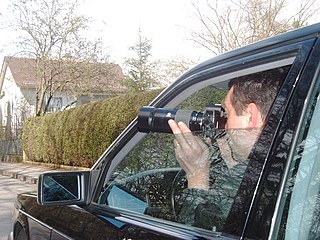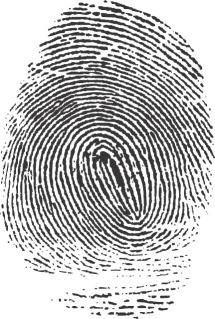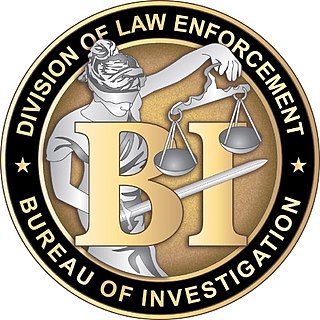
The Federal Bureau of Investigation (FBI) is the domestic intelligence and security service of the United States and its principal federal law enforcement agency. An agency of the United States Department of Justice, the FBI is a member of the U.S. Intelligence Community and reports to both the Attorney General and the Director of National Intelligence. A leading U.S. counterterrorism, counterintelligence, and criminal investigative organization, the FBI has jurisdiction over violations of more than 200 categories of federal crimes.

Forensic science, also known as criminalistics, is the application of science principles and methods to support legal decision-making in matters of criminal and civil law.

A private investigator, a private detective, or inquiry agent is a person who can be hired by individuals or groups to undertake investigatory law services. Private investigators often work for attorneys in civil and criminal cases.

A fingerprint is an impression left by the friction ridges of a human finger. The recovery of partial fingerprints from a crime scene is an important method of forensic science. Moisture and grease on a finger result in fingerprints on surfaces such as glass or metal. Deliberate impressions of entire fingerprints can be obtained by ink or other substances transferred from the peaks of friction ridges on the skin to a smooth surface such as paper. Fingerprint records normally contain impressions from the pad on the last joint of fingers and thumbs, though fingerprint cards also typically record portions of lower joint areas of the fingers.

The Federal Criminal Police Office of Germany is the federal investigative police agency of Germany, directly subordinated to the Federal Ministry of the Interior. It is headquartered in Wiesbaden, Hesse, and maintains major branch offices in Berlin and Meckenheim near Bonn. It has been headed by Holger Münch since December 2014.
The Criminal Justice Information Services Division is a division of the United States Federal Bureau of Investigation (FBI) located in Clarksburg, Harrison County, West Virginia. The CJIS was established in February 1992 and is the largest division in the FBI.

The Idaho State Police (ISP) is the statewide law enforcement agency for the State of Idaho. It began as the Bureau of Constabulary, created on May 18, 1919, under the new Department of Law Enforcement, to detect and investigate crime, "order abatement of public nuisances and to enforce such orders by appropriate court action, to suppress riots, prevent wrongs to children and animals that are inhibited by law." The state constabulary was also charged with the organization of various state, county and municipal peace officers. The bureau was dissolved by the state legislature in 1923.

The Oklahoma State Bureau of Investigation (OSBI) is an independent state law enforcement agency of the government of Oklahoma. The OSBI assists the county sheriff offices and city police departments of the state, and is the primary investigative agency of the state government. OSBI works independent of the Oklahoma Department of Public Safety to investigate criminal law violations within the state at the request of statutory authorized requesters. The OSBI was created in 1925 during the term of Governor Martin E. Trapp.
A government database collects information for various reasons, including climate monitoring, securities law compliance, geological surveys, patent applications and grants, surveillance, national security, border control, law enforcement, public health, voter registration, vehicle registration, social security, and statistics.

The California Department of Justice is a statewide investigative law enforcement agency and legal department of the California executive branch under the elected leadership of the Attorney General of California (AG) which carries out complex criminal and civil investigations, prosecutions, and other legal services throughout the US State of California. The department is equivalent to the state bureaus of investigation in other states.

The Combined DNA Index System (CODIS) is the United States national DNA database created and maintained by the Federal Bureau of Investigation. CODIS consists of three levels of information; Local DNA Index Systems (LDIS) where DNA profiles originate, State DNA Index Systems (SDIS) which allows for laboratories within states to share information, and the National DNA Index System (NDIS) which allows states to compare DNA information with one another.
The Integrated Automated Fingerprint Identification System (IAFIS) is a computerized system maintained by the Federal Bureau of Investigation (FBI) since 1999. It is a national automated fingerprint identification and criminal history system. IAFIS provides automated fingerprint search capabilities, latent searching capability, electronic image storage, and electronic exchange of fingerprints and responses. IAFIS houses the fingerprints and criminal histories of 70 million subjects in the criminal master file, 31 million civil prints and fingerprints from 73,000 known and suspected terrorists processed by the U.S. or by international law enforcement agencies.
The National Missing and Unidentified Persons System (NamUs) is a national clearinghouse and resource center for missing, unidentified, and unclaimed person cases throughout the United States.
The Ocean County Sheriff's Office or OCSO is the law enforcement agency for Ocean County, New Jersey, in the United States.

The California Bureau of Investigation is California's statewide criminal investigative bureau under the California Department of Justice, in the Division of Law Enforcement (DLE), administered by the Office of the State Attorney General that provides expert investigative services to assist local, state, tribal, and federal agencies in major criminal investigations ranging across the state.
The South Carolina Law Enforcement Division (SLED) is a statewide investigative law enforcement agency in South Carolina. SLED provides manpower and technical assistance to other law enforcement agencies and conducts investigations on behalf of the state as directed by the Governor and Attorney General. SLED Headquarters is located in the state capital, Columbia, with offices in the Midlands, Piedmont, Pee Dee, and Low Country regions.
The Garda National Economic Crime Bureau – informally known as the Fraud Squad – is a specialised division of Ireland's national police force, the Garda Síochána, that investigates economic crimes. The Bureau operates as part of the Garda Special Crime Operations branch and works alongside other sections of the force, as well as the external Office of the Director of Corporate Enforcement (ODCE), an agency tasked with investigating white-collar crime. The Economic Crime Bureau is responsible for the investigation of serious financial fraud and corruption. It was established in April 1996 and is based at Harcourt Square, Dublin 2. The GNECB is headed by an officer of Detective Chief Superintendent rank, who reports to the Assistant Commissioner of Special Crime Operations.

The Minnesota Bureau of Criminal Apprehension (BCA) is a statewide criminal investigative bureau headquartered in Saint Paul that provides expert forensic science and criminal investigation services. The BCA assists local Minnesota law enforcement agencies with complex investigations using the latest technology and techniques, and BCA personnel help secure arrests for violence-related and drug-trafficking crimes, among others. The BCA investigates all Minneapolis Police Department police killings and critical incidents.
Lt. Wallace Leo Jenkins (1896–1941) was an American law enforcement officer. He was a pioneer in the use of technology and science in South Carolina law enforcement. Jenkins served with the South Carolina Highway Patrol from its creation in 1930 until his death in 1941. He created and led the Identification Bureau, a unit that evolved into a team of skilled investigators who used technology to fight crime. The ID Bureau later merged with the South Carolina Law Enforcement Division (SLED) and became the foundation for SLED’s Criminal Justice Information Services and Forensics Services units.

Mary E. Holland was an American detective who became an early advocate for fingerprint identification in criminal investigations. She was one of the expert witnesses in the first case in which a criminal was convicted by fingerprint evidence in the United States. She "single-handedly was responsible for the accelerated acceptance of the Henry system" for classifying fingerprints in the United States. She was once called "the most noted woman criminologist in the world."












